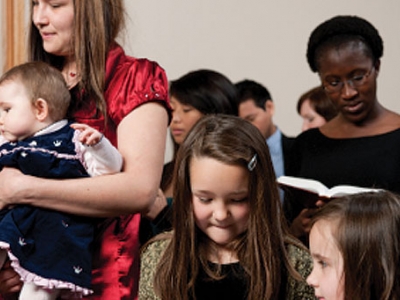
How do you talk about church in front of your kids?
The things we say have an impact on what our children think.
Words influence us. If friends rave about the Batman vs Superman movie, we eagerly go along. If people grumble about the food at the Mexican restaurant, we choose Thai. If my teenager complains that their teacher is disorganised and boring, I enter the parent teacher interview with low expectations. If a child’s words can influence the parent, how much more do a parent’s words influence the child?
Proverbs captures the power that our words have for good or for evil.
‘The words of the reckless pierce like swords, but the tongue of the wise brings healing’ Proverbs 12:18
‘The tongue has the power of life and death, and those who love it will eat its fruit’ Proverbs 18:21
Our Negative Words
Have you ever considered how your critiques about church influence your child? What do you share as you drive home from church?
‘I didn’t get much out of the sermon. It wasn't very practical’
‘The music was terrible today. Who chose that really high song?’
‘The children in my Kids Church class were wild! I don’t know why I prepared.’
‘I talked to an unusual new family today. I don’t think we’ll be friends….’
‘Our kids don’t have fun, charismatic youth leaders. The leaders are nice but…’
What world view are we shaping in our children by these comments? That the preaching should be entertaining? That church music should serve my desires? That serving shouldn’t be hard work? That I’ll only be friends with Christians who are like me? That personality is more important than godliness when it comes to Christian leadership? That church is all about me?
How do we stop saying such subtle but poisonous things about church? We need to check our hearts. Jesus says, ‘For out of the overflow of the heart, the mouth speaks’ (Luke 6:45).
What beliefs about church sit in your heart? Do you believe church is important, wonderful and central to God’s purposes? Or do you believe church is about satisfying your preferences? We all need to do a heart check, asking God to show us our blind spots so we can repent. This is Jesus’ starting point for transforming our words.
Our Positive Words
God has given us a clear command to bring up our children in the instruction of the Lord (Ephesians 6:4). What truths do we want to pass on to our children by our incidental comments about church? Here are just a few:
Church is a priority for all Christians. Church is God’s family, Jesus’ body, Jesus’ bride, and at the centre of God’s plan for the salvation of the world.
The gathering of God’s people around God in his Word is vital to the spiritual growth and endurance of all believers.
The church will grow as each member is equipped to serve one another in truth and love.
What are some ways we can communicate these truths in our day to day conversations?
Practical Tips
- Don’t criticise the preacher, service or your church family on the way home from church. Rather, choose to speak of what you learnt from the sermon, appreciated about the service, and godliness you observed in church members. Point out where you see God at work, bringing non-Christians in to his family and growing Christians.
- Intentionally speak of what you admire about the kids church and youth group leaders. Praise these leader’s commitment to the gospel, servant nature, gentle speech and hard work. Give your children role models that are worthy of following throughout their lives. By what you say, your children will learn not only who to follow, but also what godly characteristics please God.
- Say more often, ‘I LOVE my church family’. This is something I have learnt from my husband. I am reserved in nature…whereas he is passionate. He speaks out loud about his love for our church family. It amazes me that even our 15 year old still loves our church. I often wonder if this is because his dad’s words so powerfully echo God’s love for his family.
- Speak of the value of ALL churches, not just your church. One day your children will leave the church of their childhood and find another church family. Speak openly of how God would want them to choose a church, and speak positively of these characteristics when you visit churches on holidays.
When Negative can be Positive
As our children grow up, they need to hear that we know that church is not perfect, yet we love it because God does. They need to learn by our example how to respond to the imperfections they see in church. And so it is helpful to tell your teenagers that you find some sermons boring, some singing too high, some people difficult, some ministries hard work and disagree with some leadership decisions. But watch how and why you say it. Watch your heart. Our children need to see our struggle to respond in a godly way. They need to hear us bearing with one another in love and affirming perseverance with God’s family and mission. They need to hear things like,
‘Serving in kids church was hard. But I’m not doing this for me, I’m doing this to serve God and love his people. And God will sustain me’
‘I didn’t personally like the preacher’s style today, but I’m glad he speaks from God’s word each week. It’s great to go to a church which revolves around God’s word’
The Influence of Words
Words influence us. Words influence our children. What words will you speak to your children today that will reflect God’s priority and love for his church?
For more articles from Growing Faith, subscribe to our monthly e-newsletter.
To hear about the latest books and resources from Youthworks Media, subscribe here.







